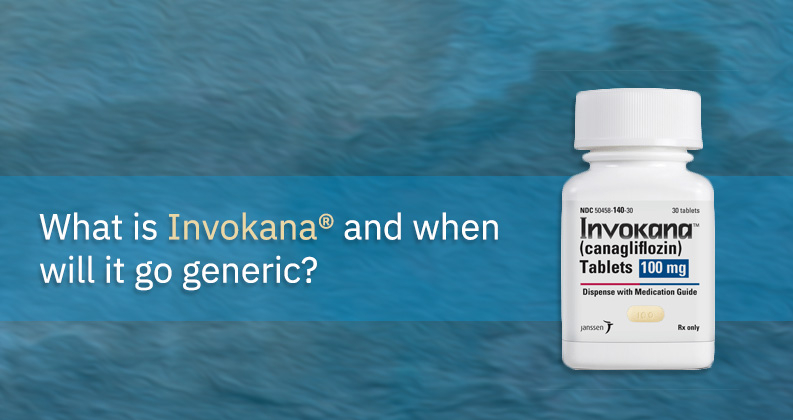
If you're living with type 2 diabetes, you may be wondering if Invokana is right for you. This medication is designed to help control blood sugar levels, and while it can be effective, there are also some potential risks to consider. In this blog post, we'll break down everything you need to know about Invokana, from how it works to its potential side effects.
When was Invokana approved?
Invokana, also known as canagliflozin, was approved in 2013 to treat adults with type 2 diabetes mellitus. It is the first SGLT2 inhibitor adjunct to diet and exercise to improve glycemic control in adults with type 2 diabetes mellitus. Invokana was developed by Janssen Pharmaceuticals, Inc., a specialty health care company that discovers and develops innovative solutions for some of the world’s most serious medical conditions.
The approval timeline for Invokana was:
● March 29th: FDA Approval
● February 9th: European Commission Approval
When is the best time of day to take Invokana?
If you are taking INVOKANA®, it is best to take it before the day's first meal. You must take Invokana at the same time every day so your blood sugar does not go too low or too high during meals. If you miss a dose, take it as soon as you remember, unless it is almost time for your next regular dose (in which case, skip it). Do not take two doses at once, and do not double up on missed doses.
If you have any questions about a missed dose, please speak to your doctor. If unsure when or how often to take INVOKANA®, talk with your doctor before starting any new medications.
Is there a generic form of Invokana
There are currently no generic alternatives to Invokana.
In the U.S., Invokana is a brand name, not a generic drug. This means that it’s subject to patents held by the original manufacturer, which prevents other companies from manufacturing their own versions of this medication for sale in the United States until those patents expire (the last patents for Invokana expire in July 2024).
Generic drug alternatives are typically available once patents on brand-name medications expire. This generally occurs 10 to 15 years after the original brand-name medication was first released in the United States.
What does Invokana do to the body?
Invokana works by helping your body lower blood sugar by increasing the amount of sodium excreted in the urine. This helps you lose approximately 100 grams of sugar each day through urination and also helps prevent some excess sugar from being absorbed into your body. In people with type 2 diabetes, there is increased pressure in the glomerulus (the filtering part of the kidneys). This causes glucose (sugar) to be retained within the kidney rather than being excreted as it normally would be by healthy kidneys.
In individuals with impaired kidney function and/or reduced glomerular filtration rate (GFR), this can lead to higher than desired glucose levels in their bloodstream.*
How much does Invokana lower A1C?
As you may know, when you eat carbohydrates, your body breaks down the sugar in those carbs and uses it for energy. If you don't have enough insulin to keep blood sugar under control, glucose builds up in your bloodstream instead of being taken up by cells where it's needed. This causes what is called hyperglycemia (too much blood sugar).
The goal of Invokana is to lower your blood sugar by making it easier for the kidneys to filter out excess glucose from the urine. It does this by blocking an enzyme that helps reabsorb glucose from the kidneys into the bloodstream. In other words, it stops some of this glucose from coming back into your body after being filtered out through urine—so less glucose stays in your system, and less goes on to be stored as fat!
Invokana lowers A1C by about 1% to 2%, roughly equivalent to how much a generic medication would lower. Invokana's active ingredient is called canagliflozin, and its patent expired in 2020—but because of a patent term extension, there won't be any generic versions of Invokana until 2023.
Can Invokana be used alone or with other medications?
Your healthcare provider will determine if you take Invokana alone or combined with other medications.
In most cases, your healthcare provider may recommend taking this medicine as part of a combination therapy plan to lower blood sugar levels. You would also be prescribed metformin (Fortamet®) or glimepiride (Amaryl®). However, there are some instances when your healthcare provider may only prescribe Invokana without prescribing any additional drugs for diabetes. That’s because even though Invokana is usually combined with another medication, it can also be used alone in people who can’t take metformin. You can take Invokana with metformin if your blood sugar is still high on metformin alone.
Studies have found that this combination of metformin and Invokana works well to lower blood sugar. Invokana and metformin are combined in a single medication called Invokamet, which may be prescribed if your doctor feels it would benefit you more than taking each separately.
Ultimately, your healthcare provider will work with you to choose the best diabetes medicines for your specific needs. He or she may recommend taking Invokana alone or combining it with another type of diabetes medicine. Your doctor may also prescribe a combination of medications to help lower blood sugar levels and stay on track with managing this condition.
What interactions should you avoid when taking invokana
● Alcohol: alcohol may affect blood glucose levels in patients with diabetes.
● Grapefruit juice: avoid taking Invokana with grapefruit juice because it can increase the risk of serious side effects from Invokana such as ketoacidosis.
● Other blood sugar-lowering medications: do not take Invokana with other medications that can increase the risk of hypoglycemia (low blood sugar) or ketoacidosis (a serious condition caused by too much acid in your body).
● Other medications that can increase the risk of hypoglycemia or ketoacidosis: avoid taking Invokana with other medications that can increase the risk of hypoglycemia (low blood sugar) or ketoacidosis (a serious condition caused by too much acid in your body).
Does Invokana cause weight loss?
Invokana is not a weight loss drug but may help you lose weight. In clinical trials, people who took Invokana lost an average of 2–3% of their body weight over one year.
Results can vary by dose and when used alone or with certain other diabetes medications.
Invokana comes in 100 mg and 300 mg doses. In studies, people lost slightly more weight on the higher 300 mg dose than on the 100 mg dose.
In addition to helping patients lose weight, Invokana led to improvements in HbA1c levels (a measure of blood glucose control over time) as well as reductions in systolic blood pressure (the top number) at both doses studied: 100 mg and 300 mg per day for up to 48 weeks were compared against placebo.
What are the common side effects of Invokana?
Here are some potential side effects that have been reported by patients taking Invokana:
● Headache.
● Nausea.
● Stomach pain.
● Diarrhea.
● Fever.
● Weight loss (which may be intentional or unintentional).
● Swollen legs and/or ankles, generally mild and temporary in nature but reported more frequently than in other SGLT2 inhibitors like Jardiance or Farxiga ("Farxiga").
What are the potential serious side effects of taking Invokana?
There are some serious side effects associated with Invokana. These include:
● Lactic acidosis - this is a buildup of lactic acid in the blood, which can be fatal if left untreated; symptoms include feeling very tired and weak, shortness of breath, nausea or vomiting, stomach pain and low blood pressure.
● Dehydration - dehydration is when you don't have enough water in your body; it's important to drink lots of fluids when taking Invokana as this helps prevent lactic acidosis but also other conditions like constipation and urinary tract infections (UTIs).
● Ketoacidosis - ketoacidosis occurs when there isn't enough insulin in your body because you aren't managing your diabetes properly – this causes high levels of acids called ketones to build up inside the body causing nausea, vomiting and abdominal pain along with other symptoms such as restlessness or confusion
● Amputations - Invokana increases your risk of amputations, especially if you have nerve damage or poor circulation. Vaginal yeast infection - this is an overgrowth of yeast in the vagina that causes itching and burning along with thick white discharge that smells like breadcrumbs (yeast). Male yeast infections can occur too but it's less common.
As with all medications, there's a risk of serious side effects and the most important thing is to find out what these are before you start taking Invokana or any drug. If you are pregnant or planning to become pregnant ask your doctor about the benefits, risks, and alternatives available.
How much does Invokana cost?
Now that you know what Invokana is and how it works, let's talk about the cost. The effective date for this prescription medication is April 1, 2018.
The retail price of Invokana is $361.00 per month but can increase depending on your insurance plan or discount card. If you don't have insurance, then the co-pay may be up to $600 per month depending on your specific pharmacy and other variables such as generics being available in your area at that time (if not then the price could be higher). Some pharmacies will require a co-pay of up to $1000 per month for brand name medications such as Invokana unless there are coupons available online providing a discount off these costs (for example, getting paid back by using an online prescription coupon).
What are the pros and cons of Invokana?
● Pros:
● It helps control blood sugar levels in people with type 2 diabetes.
● It is taken once a day, and can be taken with or without food.
● It is also safe for pregnant women to take, but it should be used only if other treatments don't work.
● Cons:
● If you have kidney problems, it's not safe to take this medicine because it may cause you to lose too much fluid and become dehydrated.
● The drug will not give you energy or make you feel better if your body isn't producing enough insulin on its own (which can happen if there are problems with the pancreas). In these cases, this medication won't improve your blood sugar levels and could even cause them to rise higher than they were before taking Invokana!
Conclusion
In conclusion, Invokana is a drug that was created to help patients with type 2 diabetes. These patients who take this medication can experience lower blood sugar levels and an increased risk of ketoacidosis. There are several side effects associated with this drug, so it's important that you understand these before starting any new medication regimen.







